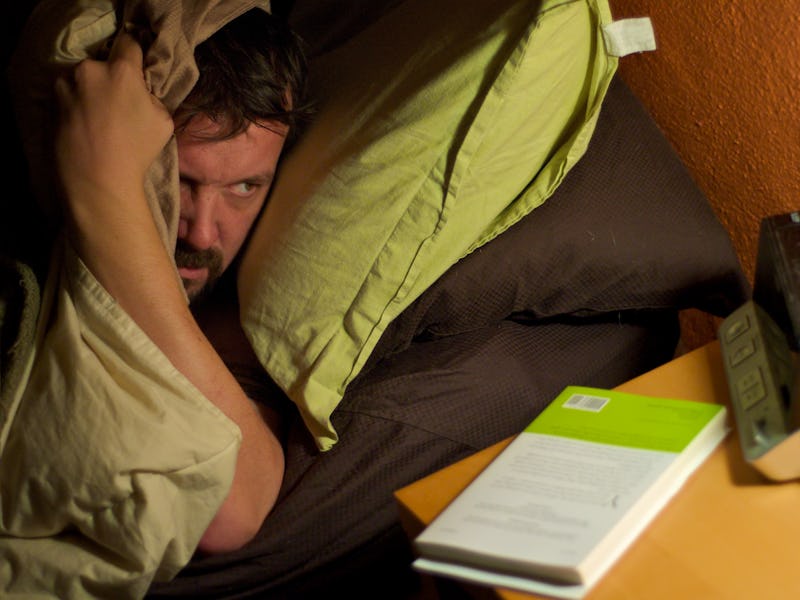We’ve all pulled an all-nighter at least once. We know it’s probably not a good idea, but sometimes we have work that needs to get done. Or maybe we don’t even mean to, like when we’re playing video games at night, and before we know it the sun is coming up. What you may not know is that in certain cases, it can actually be good for your mental health. And new research suggests that under the right conditions, for the right people, the negative effects can be easily mediated.
Sleep deprivation has emerged in recent years as a viable treatment for depression. This sounds strange, given research that says sleep deprived adults are more stressed and electronic devices screw up our circadian rhythm. But it’s true. Research has found that the build-up of the neurotransmitter adenosine that happens when you stay up for a long time is responsible for the antidepressant effects of sleep deprivation. And new research finds that the decline in cognitive processing ability that happens under sleep pressure — a term that describes declines in attention and memory during sleepiness — goes away quickly after a good, long rest — for some people.
In a study published Monday in the journal Proceedings of the National Academy of Sciences, scientists found that the brains of some twenty-somethings recover fairly quickly from long periods of sleep deprivation, as long as these people have certain brain chemistry (which we’ll discuss lower) and as long as they receive a properly long recovery sleep.
To conduct this research, German researchers had 34 people, averaging 27 years of age, stay up for 52 hours. During this time, the subjects underwent regular PET scans to look for the activity of a particular receptor in different parts of the brain, one that researchers hypothesized is responsible for the mood benefits and cognitive liabilities of sleep deprivation.
The cause of these changes, say the researchers, lies in the functional A1 adenosine receptor (A1AR). Test subjects who experienced prolonged sleep deprivation showed elevated A1AR availability, correlating with declining cognitive function and increasing sleep pressure.
In figure C, the PET-scanned brains of subjects after 52 hours of sleep deprivation show elevated A1AR availability. In figure D, you can see that the availability of A1AR decreased after 14 hours of sleep.
Most interestingly, the researchers found that after 14 hours of recovery sleep, most subjects’ A1AR availability recovered to control levels. They also found that some subjects, ones who showed greater increases in A1AR availability, were better able to recover from sleep loss. This means some people may be naturally inclined to suffer fewer negative side effects of prolonged periods of wakefulness. It’s not clear what causes this natural inclination, though.
The study results also suggest that 52 hours may be more than necessary to trigger the effects of sleep deprivation.
“Compared with a previous human study in which we investigated A1AR availability after 28 h of sleep deprivation, there was no significant additional increase in receptor availability in the present study with 52 h of sleep deprivation, although the sample sizes might have been too small to detect subtle differences,” write the authors.
Additional research, with more subjects, is needed to further confirm these results, but these findings may help shed some light on why sleep deprivation affects some people more than others. Lastly, a takeaway point for the home sleep experimenter: If you don’t know what your A1AR availability levels are, it might not be the best idea to avoid researching sleep deprivation on yourself, since you don’t know the degree to which you can bounce back. Besides, who has 14 hours to recover anyway?
Abstract: Adenosine and functional A1 adenosine receptor (A1AR) availability are supposed to mediate sleep–wake regulation and cognitive performance. We hypothesized that cerebral A1AR availability after an extended wake period decreases to a well-rested state after recovery sleep. [18F] CPFPX positron emission tomography was used to quantify A1AR availability in 15 healthy male adults after 52 h of sleep deprivation and following 14 h of recovery sleep. Data were additionally compared with A1AR values after 8 h of baseline sleep from an earlier dataset. Polysomnography, cognitive performance, and sleepiness were monitored. Recovery from sleep deprivation was associated with a decrease in A1AR availability in several brain regions, ranging from 11% (insula) to 14% (striatum). A1AR availabilities after recovery did not differ from baseline sleep in the control group. The degree of performance impairment, sleepiness, and homeostatic sleep-pressure response to sleep deprivation correlated negatively with the decrease in A1AR availability. Sleep deprivation resulted in a higher A1AR availability in the human brain. The increase that was observed after 52 h of wakefulness was restored to control levels during a 14-h recovery sleep episode. Individuals with a large increase in A1AR availability were more resilient to sleep-loss effects than those with a subtle increase. This pattern implies that differences in endogenous adenosine and A1AR availability might be causal for individual responses to sleep loss.
